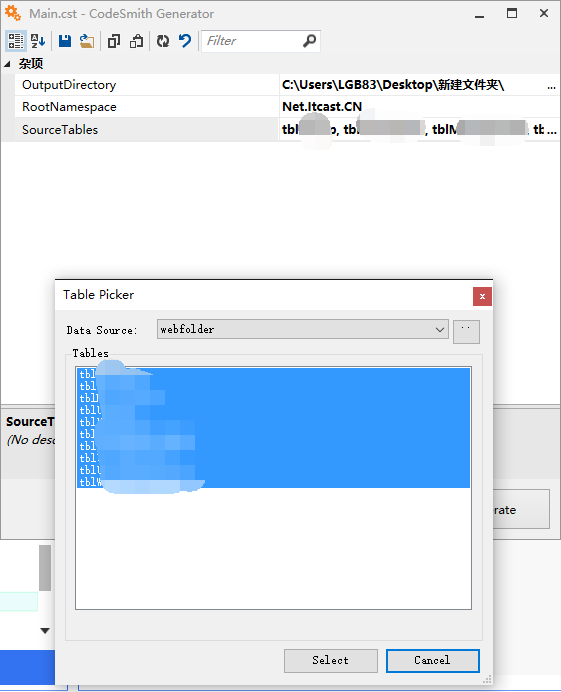对于.NET平台上的代码生成器来说,codesmith是一个非常好的选择。
以前在学院实验室用的都是SQL server数据库,老师给的一套codesmith模板用来生成model/DAL/BLL很是方便。
不过后来放弃SQL server 投入MySQL之后,刚开始都是手写SQL,还是很痛苦的。
再后来又去找MySQL codesmith模板,这个对应的资料就不多了。不过最后还是找到了一套不错的,凑合能用。起初也懒,codesmith语法不熟,就没想过去修改一下了。
最近又要用到这套东西,于是决定还是去修改一番,更便于使用。这个文章就主要讲一下修改过程,顺便说一下codesmith的简单语法。
先说一下操作步骤:
把模板的文件夹扔到codesmith模板文件的路径下,接着打开Codesmith,找到刚扔过去的文件夹,选择Main.cst,右键-execute-选择对应的MySQL库-选中表。
(注:codesmith连接MySQL有问题的话,
移步这里解决 CodeSmith 连接MySQL数据库报“can’t find .net framework data provider”)
如下图:

然后点击Generate就能顺利生成model/dal/bll了。
生成代码结构如下:

这样操作没什么问题,顺利生成了我们要的model/dal/bll了,然后....我懒嘛。
每次都要把表一个个选一次,麻不麻烦啊。然后就想了,能不能改一下模板呢。于是便开始google相关资料了。找到了几个相关文章,参考这就开始改造了。
先看看原来的Main.cst里面写了撒。
1
2
3
4
5
6
7
8
9
10
11
12
13
14
15
16
17
18
19
20
21
22
23
24
25
26
27
28
29
30
31
32
33
34
35
36
37
38
39
40
41
42
|
<%@ CodeTemplate Language="C#" ResponseEncoding="UTF-8"
TargetLanguage="Text" Src="" Inherits="" Debug="False"
Description="Template description here."
Output="None"%>
<%@ Register Name="Models" Template="DBMad.Models.cst"
MergeProperties="False" ExcludeProperties="" %>
<%@ Register Name="DAL" Template="DBMad.DAL.cst"
MergeProperties="False" ExcludeProperties="" %>
<%@ Register Name="BLL" Template="DBMad.BLL.cst"
MergeProperties="False" ExcludeProperties="" %>
<%@ Property Name="SourceTable"
Type="SchemaExplorer.TableSchema" Optional="False"%>
<%@ Property Name="RootNamespace" Default="Net.Itcast.CN"
Type="System.String" Optional="False"%>
<%@ Assembly Name="SchemaExplorer" %>
<%@ Assembly Name="System.Data" %>
<%@ Import Namespace="SchemaExplorer" %>
<%@ Import Namespace="System.Data" %>
<script runat="template">
private string _outputDirectory = String.Empty;
[Editor(typeof(System.Windows.Forms.Design.FolderNameEditor),
typeof(System.Drawing.Design.UITypeEditor))]
[Description("The directory to output the results to.")]
public string OutputDirectory
{
get
{
return _outputDirectory;
}
set
{
if (value != null && !value.EndsWith("\\"))
{
value += "\\";
}
_outputDirectory = value;
}
}
</script>
|
这一段基本就是在声明选项以及引用命名空间,表现出来的便是我们看到的下图:

1
2
3
4
5
6
7
8
9
10
11
12
13
14
15
16
17
18
19
20
21
22
23
24
25
26
27
28
|
<%
Models model = this.Create<Models>();
model.ModelsNamespace = this.RootNamespace+".Model";
model.TargetTable = this.SourceTable;
model.RenderToFile(this.OutputDirectory+"Model/"+model.GetFileName(),true);
DAL dal = this.Create<DAL>();
dal.TargetTable = this.SourceTable;
dal.ModelsNamespace = model.ModelsNamespace;
dal.DALClassNameSurfix = "DAL";
dal.DALNamespace =this.RootNamespace+".DAL";
dal.RenderToFile(this.OutputDirectory+"DAL/"
+dal.GetFileName(),true);
BLL bll = this.Create<BLL>();
bll.ModelsNamespace = model.ModelsNamespace;
bll.DALClassNameSurfix = dal.DALClassNameSurfix;
bll.DALNamespace = dal.DALNamespace;
bll.BLLClassNameSurfix = "BLL";
bll.BLLNamespace = this.RootNamespace+".BLL";
bll.TargetTable = this.SourceTable;
bll.RenderToFile(this.OutputDirectory+"BLL/"
+bll.GetFileName(),true);
Response.Write("ok,see "+this.OutputDirectory);
%>
|
这一段就是我们点击Generate之后执行的代码,基本功能就是调用
DBMad.Models.cst,DBMad.DAL.cst,DBMad.BLL.cst。
因为在上面声明数据源的时候,使用了SchemaExplorer.TableSchema,导致我们选择表的时候不能多选。代码如下:
<%@ Property Name=“SourceTable” Type=“SchemaExplorer.TableSchema” Optional=“False”%>
这样一想,这个Main.cst就是一个可以处理单表的生成模板了,我们只要自己写一个可以多选表的模板,然后循环调用这个模板去生成,不就完事了?
找了一下资料,发现只需要把上面的选项Type改一下,便可以多选表了。
如下:
<%@ Property Name=“SourceTables” Type=“SchemaExplorer.TableSchemaCollection” Default="" Optional=“False” Category=""%>
整体代码如下:
1
2
3
4
5
6
7
8
9
10
11
12
13
14
15
16
17
18
19
20
21
22
23
24
25
26
27
28
29
30
31
32
33
34
35
36
37
38
39
40
41
42
43
44
45
46
47
48
49
| <%@ CodeTemplate Language="C#" ResponseEncoding="UTF-8"
TargetLanguage="Text" Src="" Inherits="" Debug="False"
Description="Template description here." Output="None"%>
<%@ Property Name="SourceTables"
Type="SchemaExplorer.TableSchemaCollection" Default=""
Optional="False" Category=""%>
<%@ Register Name="SE" Template="CreatSingleTable.cst"
MergeProperties="False" ExcludeProperties="" %>
<%@ Property Name="RootNamespace" Default="Net.Itcast.CN"
Type="System.String" Optional="False"%>
<%@ Assembly Name="SchemaExplorer" %>
<%@ Assembly Name="System.Data" %>
<%@ Import Namespace="SchemaExplorer" %>
<%@ Import Namespace="System.Data" %>
<%@ Import Namespace="System.Collections" %>
<script runat="template">
private string _outputDirectory = String.Empty;
[Editor(typeof(System.Windows.Forms.Design.FolderNameEditor),
typeof(System.Drawing.Design.UITypeEditor))]
[Description("The directory to output the results to.")]
public string OutputDirectory
{
get
{
return _outputDirectory;
}
set
{
if (value != null && !value.EndsWith("\\"))
{
value += "\\";
}
_outputDirectory = value;
}
}
</script>
<%
foreach(TableSchema ts in SourceTables)
{
SE s = new SE();
s.SourceTable = ts;
s.RootNamespace = RootNamespace;
s.OutputDirectory = OutputDirectory;
s.Render(this.Response);
}
%>
<script runat="template">
</script>
|
前面一部分还是一样的声明,
<%@ Property Name=“SourceTables” Type=“SchemaExplorer.TableSchemaCollection” Default="" Optional=“False” Category=""%>
这一句把选项类型修改成可多选的(既 集合)。
效果如下图:

1
2
3
4
5
6
7
8
9
10
11
12
| <%
foreach(TableSchema ts in SourceTables)
{
SE s = new SE();
s.SourceTable = ts;
s.RootNamespace = RootNamespace;
s.OutputDirectory = OutputDirectory;
s.Render(this.Response);
}
%>
<script runat="template">
</script>
|
这一段代码便是获取刚得到的表集合,遍历集合然后依次调用之前的单表生成模板。
到这里差不多已经完成了我要的效果,选择多表,实现一次生成所有的表对应的model/dal/bll。
这个效果基本就是我要的了,但是后来又发现,model里面的字段居然没有注释,我在建表的时候写了字段注释的呀。
打开model的cst文件之后发现,模板并没有做注释这个工作。
代码如下:
1
2
3
4
5
6
7
8
9
10
11
12
13
14
15
16
17
18
19
20
21
22
23
24
25
26
27
28
29
30
31
32
33
34
35
36
37
38
39
40
41
42
43
44
45
46
47
48
49
50
51
52
53
54
55
56
57
58
59
| <%@ CodeTemplate Language="C#" TargetLanguage="C#"
Src="ToolsCodeTemplate.cs" Inherits="ToolsCodeTemplate"%>
<%@ Property Name="TargetTable" Type="SchemaExplorer.TableSchema"
Category="Context" Description="TargetTable that the object is
based on." %>
<%@ Property Name="ModelsNamespace" Default="Model"
Type="System.String" Category="Context" Description="TargetTable
that the object is based on." %>
<%@ Assembly Name="SchemaExplorer" %>
<%@ Assembly Name="System.Data" %>
<%@ Import Namespace="SchemaExplorer" %>
<%@ Import Namespace="System.Data" %>
<% PrintHeader(); %>
using System;
using System.Collections.Generic;
using System.Text;
namespace <%= ModelsNamespace %>
{
[Serializable()]
public class <%= GetModelClassName() %>
{
<%
foreach (ColumnSchema column in TargetTable.Columns)
{
%>
private <%= GetPropertyType(column) %> _<%=
GetPropertyName(column) %>;
<%
}
%>
<%
foreach (ColumnSchema column in TargetTable.Columns)
{
%>
public <%= GetPropertyType(column) %> <%=
GetPropertyName(column) %>
{
get { return _<%= GetPropertyName(column) %>; }
set { _<%= GetPropertyName(column) %> = value; }
}
<%
}
%>
}
}
<script runat="template">
public string GetModelClassName()
{
return GetModelClassName(TargetTable);
}
public override string GetFileName()
{
return this.GetModelClassName(this.TargetTable) + ".cs";
}
</script>
|
获取表中字段名使用的是GetPropertyName(column),咦,在哪实现了这个东西呢?回去翻一下文件,哦,还有一个ToolsCodeTemplate.cs文一直没管呢。
果然,GetPropertyName(column)在这里。
1
2
3
4
5
6
7
8
9
| public string GetPropertyName(ColumnSchema column)
{
return GetNameFromDBFieldName(column);
}
public string GetNameFromDBFieldName(ColumnSchema column)
{
return column.Name;
}
|
读取列名就是这么简单,那么我们对应写一个函数读取一下列注释,然后再model里面调用一下不好了。
又查了一下资料,
1
2
3
4
| public string GetColumnComment(ColumnSchema column)
{
return column.Description;
}
|
嗯,理论上这样是可以的…
然而,我想多了。倒腾了好久,这个属性值都是空的…
google了一圈之后发现,原来是SchemaExplorer.MySQLSchemaProvider.dll 里面压根没实现读取列注释的实现….
不过也有对应的解决方法:
完美解决CodeSmith无法获取MySQL表及列Description说明注释的方案
把DLL替换一下就好了。
最后附上模板连接:CodeSmith-for-MySQL-Template
注:
- 模板会把MySQL的表名前三个字符截取掉,建议把表明设置为tbl开头,或者自行修改模板文件。
- 想让字段注释生效记得替换SchemaExplorer.MySQLSchemaProvider.dll(替换前记得备份!)